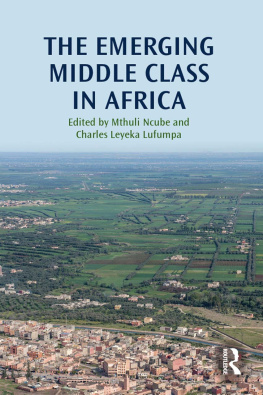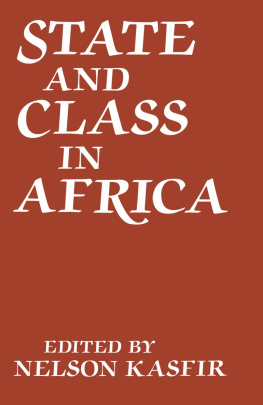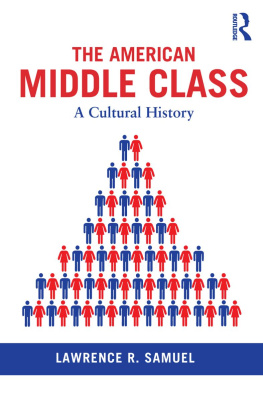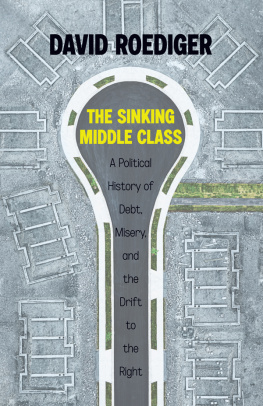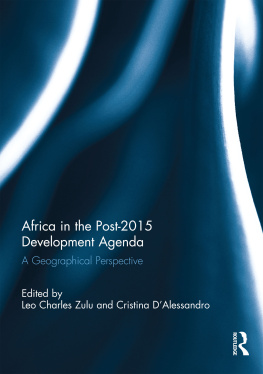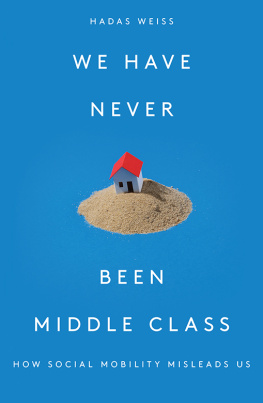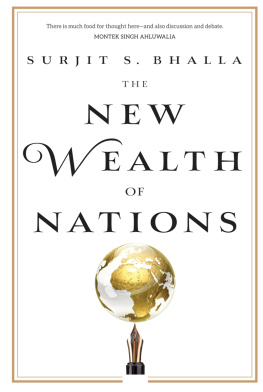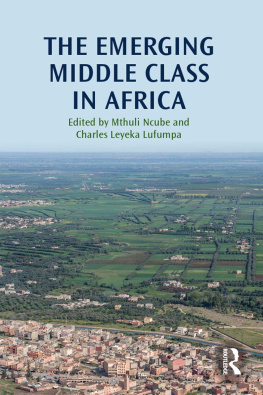Lufumpa Charles Leyeka - The Emerging Middle Class in Africa
Here you can read online Lufumpa Charles Leyeka - The Emerging Middle Class in Africa full text of the book (entire story) in english for free. Download pdf and epub, get meaning, cover and reviews about this ebook. City: London;New York;Africa, year: 2015, publisher: Taylor and Francis;Routledge, genre: Politics. Description of the work, (preface) as well as reviews are available. Best literature library LitArk.com created for fans of good reading and offers a wide selection of genres:
Romance novel
Science fiction
Adventure
Detective
Science
History
Home and family
Prose
Art
Politics
Computer
Non-fiction
Religion
Business
Children
Humor
Choose a favorite category and find really read worthwhile books. Enjoy immersion in the world of imagination, feel the emotions of the characters or learn something new for yourself, make an fascinating discovery.
- Book:The Emerging Middle Class in Africa
- Author:
- Publisher:Taylor and Francis;Routledge
- Genre:
- Year:2015
- City:London;New York;Africa
- Rating:4 / 5
- Favourites:Add to favourites
- Your mark:
- 80
- 1
- 2
- 3
- 4
- 5
The Emerging Middle Class in Africa: summary, description and annotation
We offer to read an annotation, description, summary or preface (depends on what the author of the book "The Emerging Middle Class in Africa" wrote himself). If you haven't found the necessary information about the book — write in the comments, we will try to find it.
The Emerging Middle Class in Africa — read online for free the complete book (whole text) full work
Below is the text of the book, divided by pages. System saving the place of the last page read, allows you to conveniently read the book "The Emerging Middle Class in Africa" online for free, without having to search again every time where you left off. Put a bookmark, and you can go to the page where you finished reading at any time.
Font size:
Interval:
Bookmark:

THE EMERGING MIDDLE CLASS IN AFRICA
The emergence of the middle class as a driver of Africas economic growth stands out as an important milestone in contemporary economic history. This growth, though uneven, is a source of hope for Africa, but also a signal to the rest of the world on the prospects for economic recovery and renewal, particularly because it has been steady despite the global downturn.
The Emerging Middle Class in Africa analyzes specific aspects of the lives of the middle class in Africa. It looks at how people become and remain in the middle class through a series of thematic chapters. It examines how behavior changes in the process, in terms of consumption patterns and spending on health and education. A further dimension taken up in this analysis is how class impacts gender relations and whether women are able to reap the same benefits of social advancement available to men. Africa is a continent of such scale and diversity that experiences across countries vary widely. The book thus captures the common patterns across the continent.
This text is primarily aimed at Africanist researchers, policymakers, development practitioners, and bilateral and multilateral institutions, as well as students of African studies, political science, political economy, development studies, and development economics.
Mthuli Ncube is Chief Economist and Vice-President of the African Development Bank Group. He oversees the process of knowledge generation and management within the bank and its regional member countries. Professor Ncube is a Senior Research Fellow at the Blavatnik School of Government, University of Oxford, UK and a Research Fellow at St Anthonys College, University of Oxford, UK.
Charles Leyeka Lufumpa is Director of the Statistics Department at the African Development Bank Group. He oversees the banks activities to build statistical capacity as well as the data needs for results measurement in its operations in African countries.
Since the beginning of this new Millennium Africa has enjoyed an unprecedented growth spell and a significant reduction in poverty. One of the correlates of the present growth spell is the emergence of a middle class. This volume describes clearly the importance of education and health in helping poor households move gradually into a higher and more diversified consumption pattern. Likewise, a successful structural transformation providing workers moving out of agriculture with stable and salaried jobs in non-agricultural sectors is crucial to the creation of a middle class. Another contribution of this book is to show the close interrelationship between the existence of a middle class and improved governance and the appearance of democratic institutions. While many obstacles still need to be overcome before a strong and sustainable middle class dominates the social fabric in Africa, this volume provides the reader with a bright ray of hope.
Erik Thorbecke, Cornell University, USA
The global economic sentiment around Sub-Saharan Africa has changed dramatically over the last few years. From being viewed as a continent rife with political and economic uncertainty, together with a tendency toward economic and social collapse, the current dominating view is that Sub-Saharan Africa remains the last of the great untapped markets, ripe for rapid growth and development. These views are supported by the data, which show that six of the worlds ten fastest growing economies during 20012010 were in Sub-Saharan Africa. In this timely book, we are given a unique and data-rich insight into one of the key manifestations of this great African renaissance the rise of the African middle class. Through the expert hands of Mthuli Ncube and Charles Lufumpa, the various authors deal carefully and systematically with issues ranging from the size and shape of this new, huge consumer market to the role played by educational institutions in ensuring the sustenance of this class. As a compendium for those interested in understanding one of the key drivers of this continents economic future this volume will prove indispensable.
Haroon Bhorat, University of Cape Town, South Africa
These are exciting times in Africa. The region has witnessed sustained growth for about two decades in proportions that parallel Asian tigers. The Africa growth renaissance is not accidental, but generated by fruits of extensive economic and financial sector reforms, including empowerment of private initiative and human capital development resulting from investment in quality education and technology. The growth dividend has manifested itself in improved access to health, clean water, education, reduction in infant mortality, and reduction in poverty. While the growth syndrome is widely celebrated in the Africa Rising story, there are still issues of lack of growth inclusiveness and insufficient sharing of prosperity. However, one dimension that has not yet received sufficient attention, and that needs to be equally celebrated, is the emergence of African middle class which is associated with strong African growth. Ncube and Lufumpa (Eds.) provide the first comprehensive documentation of the rising African middle class based on a consumption model, and, equally important, they catalogue the drivers of this emerging class, along with its multiplier effect on future growth, improved governance, innovation, and even enhanced global integration of the region. The book makes it clear that the lower end of the middle class is still vulnerable, and on the edge, with the possibility of devolving into subsistence, but they provide a menu of risk management mechanisms to mitigate such vulnerabilities. This book is uplifting, methodologically and intellectually sound, and rich in policy prescriptions. A must read for researchers, educators, policy makers, and global partners. As AERC (www.aercafrica.org) Executive Director, I am heartened by this policy and intellectually rich book, since it is getting widely known that informed policy making is among the key factors of production for Africa growth, and the resulting middle class, with AERC at the center of capacity building for informed policy making over the last 25 years. I salute Mthuli and Lufumpa for putting together such an informative and timely book.
Lemma W. Senbet, African Economic Research Consortium, and University of Maryland, USA
A timely topic, by genuine experts.
Paul Collier, University of Oxford, UK
THE EMERGING MIDDLE CLASS IN AFRICA
Edited by Mthuli Ncube and Charles Leyeka Lufumpa

First published 2015
by Routledge
2 Park Square, Milton Park, Abingdon, Oxon OX14 4RN
and by Routledge
711 Third Avenue, New York, NY 10017
Routledge is an imprint of the Taylor & Francis Group, an informa business
2015 African Development Bank
The right of the editors to be identified as the author of the editorial material, and of the authors for their individual chapters, has been asserted in accordance with sections 77 and 78 of the Copyright, Designs and Patents Act 1988.
All rights reserved. No part of this book may be reprinted or reproduced or utilised in any form or by any electronic, mechanical, or other means, now known or hereafter invented, including photocopying and recording, or in any information storage or retrieval system, without permission in writing from the publishers.
Trademark notice: Product or corporate names may be trademarks or registered trademarks, and are used only for identification and explanation without intent to infringe.
Next pageFont size:
Interval:
Bookmark:
Similar books «The Emerging Middle Class in Africa»
Look at similar books to The Emerging Middle Class in Africa. We have selected literature similar in name and meaning in the hope of providing readers with more options to find new, interesting, not yet read works.
Discussion, reviews of the book The Emerging Middle Class in Africa and just readers' own opinions. Leave your comments, write what you think about the work, its meaning or the main characters. Specify what exactly you liked and what you didn't like, and why you think so.

